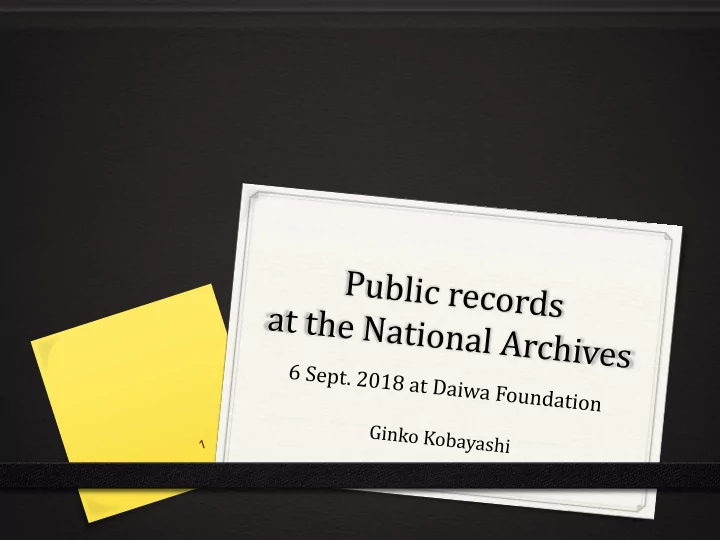

Today * A brief history of public record keeping in the UK * What’s in store at the National Archives * Keeping records in UK and Japan 2
The National Archives=(TNA) * Formerly the Public Record Office (PRO) * Volume: Stacked up in a pile, it could reach 160 km to 200 km (11 million records) * About 600 staff members (10 times of Japan’s) 3
At Kew, southeast London 4
How the PRO (1838) was set up * Records were scattered around at various places (Westminster areas, Tower of London etc.) * Debate from around 1800 for 30 years (The Record Commission) * Henry Cole and cats: “A cat was subsequently found, and if the Committee are disposed to see it, I can produce it, as well as the skeletons of a cat and the rats.” (A cat and some rats were presented.) 5
Who does what? * 1958 Public Records Act * Govt ministries to decide which records to send * The PRO/TNA will give guidance, coordinate and supervise *20-year rule (public records made available after 20 years) (Initially, a 30-year rule then 50 years made public) 6
Freedom of Information Act * Since 2005 * Citizens have the right to access records the public organizations have * Govt ministries, agencies, public orgs, publicly-run schools 7
Domesday Book (1086) (land ledger) 8
Writing by a quill in Latin on parchment 9
Tally sticks Records of the debts (from 12 th century) 10
The stick would be split in half. The debtor would retain half. The creditor would retain the other half. 11
Pipe rolls 12
13
14
Records in a box 15
Treasury records in the 13 th century 16
Pictograms 17
18
19
Specially made boxes 20
‘World History through Public Records in Britain’ * An introduction to public records kept at the National Archives 21
(1) Hiroshima, Nagasaki, three months after the atomic bombing * A 15-member research team from UK * Finding out ways to protect Britain if and when Europe is attacked by A-bombs 22
Central area of Nagasaki city 23
How buildings are constructed and damaged 24
Numerous photos 25
(2) A Japanese man who helped a double spy in WW2 * ‘Tate’ -- Pretending to be a German spy * How to give him the funds/money? * A Japanese man tries to help… 26
Mitinori Yosii 27
(3) Churchill’s handwritten memo ‘Percentage Agreement’ * October 1944: A secret agreement to divide the Balkans and other European nations *Romania (Russia 90%, the others 10%), Greece (GB 90%, the others 10%), Hungary (50/50%) *Power of the original docs 28
Public records and UK * Public records=Records of history * Putting efforts in acquiring and keeping information * Information is power 29
Scandals in Japan * Ministry of Defence: Logs from troops deployed in Iraq: “Lost” and “found” * Moritomo Gakuen school scandal: Docs related to the discounted sale of a state- owned land “discarded” and “falsified.” (In order not to reveal any involvement of Mr & Mr Abe to the school or the sale) * Kake Gakuen school scandal: Docs linking Mr Abe and the opening of a new medical department: Are they credible? 30
UK – Suez Crisis 1956 * Doesn’t happen in Britain? -Suze Crisis of 1956: PM Eden was in a secret agreement with the French and the Israelis following the nationalisation by the Egyptian Government of the Suez Canal. Under the agreement the Israelis would invade Egypt and Britain would then send troops to "protect the canal" and so get it back in Western hands. “ Eden never admitted that the secret agreement existed and ordered his Cabinet Secretary to destroy the documents, which he did. “ ” (Martin Steel, author of books on civil servants) 31
Factors stopping falsification *Peer pressure not to falsify *A lot of people will be involved (therefore, it doesn’t happen) *Ministers not asking bureaucrats to falsify (*Robust media=acting as a watchdog) 32
Japan and UK * History -Japan – National Archives of Japan were opened in 1971 -UK — PRO opened in 1838 * Observations: “Japanese people(bureaucrats) think that, if there are documents, they will be criticized. In Britain, people release records in order to argue their decision- making was correct.” (Prof. Munehiro Miwa at Kyushu University) * Traditions/Strategic thinking : “Information is power.” 33
Thank you very much Ginko Kobayashi ginkokoba@googlemail.com 34
Recommend
More recommend